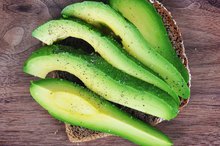St John's Wort & Food Interactions
St. John's Wort has been recommended for centuries as a treatment for a wide variety of illnesses 3. Otherwise known as Hypericum Perforatum L. or goat weed, extracts from the leaves and flowers of the plant today are often used by some people for mild to moderate depression and anxiety. While interactions with specific drugs have been well discussed and are common knowledge, there has also been some concern expressed about possible interactions with specific foods and St. John's Wort 3.
If you are experiencing serious medical symptoms, seek emergency treatment immediately.
St. John's Wort and Depression
Current research has shown that St. John's Wort has been effective in relieving symptoms of mild to moderate depression for short-term use 3. According to an article published in Psychosomatics, short-term use is defined to as one to three months. Long-term implications of the drug have not been assessed. This differs from recommendations by Dr. Andrew Weil, who suggests taking 300 mg twice three times daily and anticipating a two-month delay before the antidepressant activity is noticeable. St. John's Wort has not been proven effective for severe depression or cancer 3.
Misconceptions
How to Discontinue Seroquel
Learn More
Experimentally, St John's Wort has functioned as a weak MAO inhibitor 23. MAO inhibitors are a strong class of medications used to treat depression. Generally, foods that are high in tyramine are avoided with MAO inhibitors. According to the review article in Psychosomatics, there have been reported incidents of MAO-type interactions in humans with St. John's Wort but the occurrences are rare 13.
That said, it would be wise to avoid large quantities of foods high in tyramine while taking St. John's Wort so that you do not risk the chance of a hypertensive crisis 3. Foods high in tyramine include aged meats and cheeses, red wine and overripe avocados. Please see the reference section for a full list of these foods. See your physician immediately if you feel flushed and have a crushing headache after eating these foods and taking St. John's Wort 3.
Concerns
Many supplements contain properties that thin the blood. This is generally a good thing for people who are healthy and not taking additional blood-thinning medications such as Coumadin. These properties are also found in the food supply. Dark, leafy greens, asparagus, broccoli and sauerkraut are all high in Vitamin K. If you are taking St. John's Wort and are already being told to limit these foods, you may find the herb is making it difficult to set your medication properly 3. Please inform your physician.
- Many supplements contain properties that thin the blood.
- Dark, leafy greens, asparagus, broccoli and sauerkraut are all high in Vitamin K. If you are taking St. John's Wort and are already being told to limit these foods, you may find the herb is making it difficult to set your medication properly 3.
Iron Absorption
Foods High in Iron That Will Not Interfere With Coumadin
Learn More
St. John's Wort contains tannins that may theoretically have an impact on iron absorption 3. Tannins are compounds naturally found in teas and wine and have been known to inhibit the absorption of iron. Consider taking the herb separately from high-iron foods as a precaution.
Expert Insight
The biggest concerns with St. John's Wort are its interactions with specific medications 3. Like with all supplements, discuss both your intent to take the herb and your depressive symptoms with a medical professional and your pharmacist before starting a regimen. Depression can be a very serious medical condition and you should be assessed by a professional trained to manage your symptoms.
Related Articles
References
- "St. John's Wort: A systematic review of adverse effects and drug interactions"; Psychosomatics; Paul Hammerness, etal.; 2003.
- Defination: MAO Inhibitor
- St. John's Wort
- Apaydin EA, Maher AR, Shanman R, et al. A systematic review of St. John’s wort for major depressive disorder. Syst Rev 5, 148 (2016) doi:10.1186/s13643-016-0325-2
- Linde K, Berner MM, Kriston L. St John's wort for major depression. Cochrane Database Syst Rev. 2008 Oct 8 (4):CD000448. doi:10.1002/14651858.CD000448.pub3
- Linde K, Kriston L, Rücker G, et al. Efficacy and acceptability of pharmacological treatments for depressive disorders in primary care: Systematic review and network meta-analysis. Ann Fam Med. 2015 Jan-Feb;13(1):69-79. doi:10.1370/afm.1687
- St. John's Wort. Natural Medicines Database. Professional Monograph. 2/22/2019
- Wong A, Townley SA. Herbal medicines and anesthesia. Continuing Education in Anaesthesia Critical Care & Pain. 2011;11(1):14-17. doi:10.1093/bjaceaccp/mkq046
- Blumenthal M, Brinckmann J, Wollschlaeger B. St. John's Wort: Clinical Overview. In: The ABC Clinical Guide to Herbs. Austin, TX: American Botanical Council; 2003:303-316.
- National Center for Complementary and Integrative Health. Questions and Answers: A Trial of St. John's Wort (Hypericum perforatum) for the Treatment of Major Depression. NIH website. Updated October 25, 2018.
Resources
Writer Bio
Mary Policastro Dinsdale is a registered dietitian. She has been affiliated with The Jack D. Weiler Hospital of the Albert Einstein College of Medicine, New York Methodist Hospital, Little Company of Mary Hospital and Cedars-Sinai Medical Center. She began freelance writing with "Gastroenterology and Endoscopy News" in 2000. Dinsdale has a Master of Science in nutrition and food studies from New York University.









